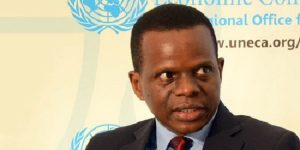Economic Commission for Africa (ECA) has urged African leaders to fully exploit the abundant critical mineral resources on the continent to accelerate sustainable industrialisation and clean energy transition.

The acting Executive Secretary of the United Nation’s (UN) ECA, Antonio Pedro, who said this in a statement on the commission’s website, spoke with leaders at a business summit on the sidelines of the United National General Assembly (UNGA) in New York.
He spoke at a panel discussion on “Extractives, Batteries, Electric Cars: Powering Tomorrow, Today”, hosted by the Global Africa Business Initiative (GABI).
Pedro said that Africa should benefit from its critical mineral resources through fair value creation.
According to him, this will ensure that her resources are used to promote resource-driven industrialisation to create jobs and enable countries to go up the value chain.
“GABI’s Unstoppable Africa is an African private sector-led platform that aims to galvanise leaders across key sectors to invest in Africa, bridging the gap between global investors and Africa’s vibrant, emerging sectors.
“The two-day event is co-convened by the UN’s Deputy Secretary-General, Amina Mohamed, and the Chairperson of the African Union, Moussa Mahamat, on the sidelines of the UNGA in New York.
“The event brings together Heads of State, Ministers, investors and UN leaders, joined by stars in music, sport and film for an exclusive two-day forum on Africa’s future,” Pedro said.
He said that the session was organised to elevate Africa’s prominence in the global economy and position the continent as the premier destination for business, trade, and investment.
He said it explored Africa’s pivotal role in the burgeoning landscape of electric cars and sustainable energy and discussed the continent’s capability for innovation and leadership in these sectors.
The ECA boss said that, in spite of Africa being endowed with an array of minerals from copper, magnesium, nickel and cobalt, the continent had not been able to make energy transition.
Pedro said that enabling policies and incentives were important in boosting investment in the value addition of critical minerals.
According to him, the value addition of critical minerals and the boom in electric vehicle demand currently rrepresented a seven trillion dollar market up to 2030 and $46 trillion by 2050.
He said: “The DRC produces over 70 per cent of the world’s cobalt. Together with Zambia, it also supplies 10 per cent of global copper.
“Moving the DRC one step up on the electric battery value chain can increase the $11 billion in mining proceeds to $270 billion.”
Ms Oluranti Doherty, Director of Export Development at Afreximbank, said that African countries needed to take ownership and leadership in the development of their mineral resources.
Doherty reiterated Afreximbank’s commitment to promoting an inclusive battery and electric vehicle value chain on the continent.
She said the bank was promoting industrialisation on the continent and was facilitating the development of Special Economic Zones in Zambia and the DRC.
“Following the signing of the framework agreement between the DRC, Zambia, ECA and Afreximbank for financial and technical assistance.
“We have put together one million dollars to support the preparation of the prefeasibility study for the creation of special economic zones in these countries,” Doherty said.
She explained that a study by BloombergNEF identified DRC as an attractive location for the manufacturing of sustainable battery precursors as it had abundant cobalt resources and hydroelectric power.
Doherty said the study was promoted by ECA, Afreximbank, AfDB, Africa Finance Corporation, the Arab Bank for Economic Development in Africa (BADEA), the African Legal Support Facility (ALSF), and the UN Global Compact.
She said the study noted that the battery precursors to be produced in the DRC would be cheaper, environmentally sustainable and competitive than a material produced in China.
Meanwhile, Brian Menell, Chair and Chief Executive Officer, TechMet Ltd, said Africa had massive opportunity to be at the forefront of the critical minerals supply for energy transition and Africa’s development.
“Africa has the mineral resources for local beneficiation and with the value addition benefiting local communities, investors are keen to forge partnerships with African governments.
“This will enable competitiveness of what is produced, ensuring high standards on sustainability, governance and transparency,” he said.
The United States is advancing critical minerals partnerships in Africa and is supportive of value addition as a shift from the extractive model of the past.
In December 2022 , the US signed an MoU with the governments of the DRC and Zambia for the value chain development in critical minerals through processing and manufacturing.
By Lucy Ogalue
